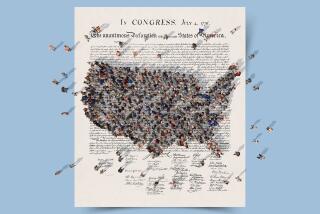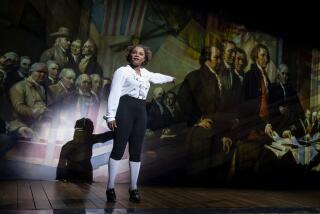Uncommon Event
- Share via
“The American Revolution was not a common event.” With that marvelous understatement, John Adams began on Feb. 13, 1818, a letter in which he discussed the origins of the American nation.
His words are worth some reflection between fireworks and television extravaganzas on this, the 210th anniversary of the Declaration of Independence, the centennial of the Statue of Liberty and the eve of our Constitution’s bicentennial.
In his epistle Adams firmly drew the distinction between the Revolutionary War as a disjointed series of battles and the Revolution as a state of mind. The real Revolution, Adams argued, developed in the minds and hearts of the residents of the British colonies in America well before the first shots were fired and before the Declaration was signed in 1776. The Revolution evolved through a “radical change in the principles, opinions, sentiments and affections of the people.”
Words were the true weapons of the Revolution. The Founding Fathers orated and debated. They studied history and philosophy and the law. They wrote petitions and pamphlets. They reasoned with their constituents, and their foes as well. While young America was a rude frontier society in many senses, it also was a highly literate society. New York University professor Neil Postman writes in a recent book that “Citizenship was not conceivable without sophisticated literacy.”
That may help explain why Thomas Paine’s pamphlet Common Sense had such a dramatic effect on delegates to the 1776 Continental Congress. It sold an estimated 500,000 copies in 1776 alone, when the colonies had fewer than 4 million residents.
The contrast with public discourse today is stark and worrisome. Today’s commemoration of the Declaration of Independence is almost entirely dominated by a non-stop television entertainment spectacular in which companies have paid $30 million to get 30-second-long commercial messages across to the public. Modern political discourse is highlighted by candidates for the U.S. Senate publicly flipping waffles and flapjacks to demonstrate each other’s alleged flip-flopping and waffling on issues whose intricacies are left unexamined. The political debate over the most far-reaching ballot proposition in a recent statewide election was dominated by television advertising that told voters absolutely nothing specific, or accurate, about what they were to vote on.
American society has become accustomed to being entertained by babble even as it is supposedly being informed. As Postman says, Americans are overwhelmingly influenced by television, and it is “a medium which presents information in a form that renders it simplistic, non-substantive, non-historical and non-contextual; that is to say, information packaged as entertainment.” And, while television may be the main culprit, other media are not immune to such criticism.
The hard work of building a new literate society must proceed in every American village, town and city; in the schools; in the libraries; in the workplace, and even in our places of leisure. The task is not without cost. In protesting budget cuts that have reduced the hours of the Library of Congress, Librarian Daniel Boorstin asked: “How can we justify or explain this to our people or the world? Dare we say, simply, that our nation--perhaps the first nation on Earth explicitly founded on knowledge--is now ready to disintegrate and destroy its own foundations?”
We cannot start America over again. But we can invigorate our nation with a fresh examination of our public discourse--of the “principles, opinions, sentiments and affections of the people” that Adams wrote about. Perhaps we can equip ourselves intellectually to be as prepared fora third century of American nationhood as the Founding Fathers were for the first. If so, John Adams might observe that this was “not a common event.”
More to Read
The complete guide to home viewing
Get Screen Gab for everything about the TV shows and streaming movies everyone’s talking about.
You may occasionally receive promotional content from the Los Angeles Times.






